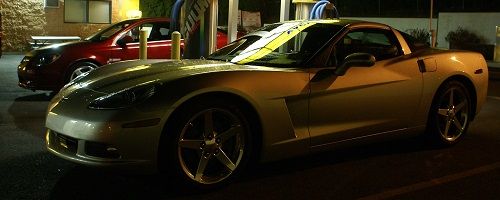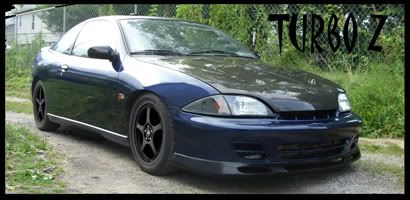ok im trying to comprehend how the velocity stacks increase the flow, now there are two different designs of velocity stacks i found but cant find anywhere how either on is more benifical, and if one is better for a boosted vs n/a application, here is two pics of the different design
rossmachine racing

full race

let the discusion begin

R.I.P. Brian Klocke, you will never be forgotten
both would have the same effect, although I must admit the ross design looks much much better


^ 10-4....can't get the right answer any easier than that.
well both of those intakes are good designs , the inlets into the ports are smooth
where as in the pic pj posted , the 1 intake has sharp edges
the 1 with the stacks not in the floor of the intake allow you to have longer runners , which changes the effective range the intake is good for
the 2.3 ho intake is like the 1st pic boosted posted

well my thoughts the more i think about it are, the ross machine would be better for boosted since its not wasting energy trying to fight to get into the runners, but more a less flowing into the runner, while the full-race could be better n/a cause all a n/a car does is pull air in, instead of air being forced in, just my take on it...

R.I.P. Brian Klocke, you will never be forgotten
I agree the rossmachine racing does look much better. I believe spyhunter had a custom manifold made for his turbo ld9, Id look into his design and see what he did if you havnt already.

spyhunters is made from using rossmachinracing.com

R.I.P. Brian Klocke, you will never be forgotten
Boosted2point4 wrote:well my thoughts the more i think about it are, the ross machine would be better for boosted since its not wasting energy trying to fight to get into the runners, but more a less flowing into the runner, while the full-race could be better n/a cause all a n/a car does is pull air in, instead of air being forced in, just my take on it...
I would've said the same thing, it just makes more sense that way.
_________________________________________
450WHP Turbo Ecotec swap in the works...

Boosted2point4 wrote:well my thoughts the more i think about it are, the ross machine would be better for boosted since its not wasting energy trying to fight to get into the runners, but more a less flowing into the runner, while the full-race could be better n/a cause all a n/a car does is pull air in, instead of air being forced in, just my take on it...
X2
although regarless of chich design either one is better then a 90* angle

word.....
so how is that project coming Brandon?
SPD RCR Z -
'02 Z24 420whp
SLO GOAT -
'04 GTO 305whp
W41 BOI -
'78 Buick Opel Isuzu W41 Swap

havent started yet brian trying to figure out which was better, whats Mr. Millers take...??

R.I.P. Brian Klocke, you will never be forgotten
Gotta love the venturi effect. :-)
Brandon, not to steal the thread or anything but did you ever get to race that AMS evo again? Noone in my auto classes can believe the allmighty evo pretty much fell to a cavalier.

Buildin' n' Boostin for 08' - Alex Richards
Not sure about Mr. Miller, but I'm thinking design one for boosted aps, and the second for all motor...... (as already posted)
SPD RCR Z -
'02 Z24 420whp
SLO GOAT -
'04 GTO 305whp
W41 BOI -
'78 Buick Opel Isuzu W41 Swap

alex no rematch havent seen or heard anything about that car in a long time, plus the cav is pretty worthless on the street now.... got a new vid up from the track the other night tho....

R.I.P. Brian Klocke, you will never be forgotten
I'd go with what everyone else is saying man...
 LE61T PTE6262 Powered
LE61T PTE6262 Powered 
"well my thoughts the more i think about it are, the ross machine would be better for boosted since its not wasting energy trying to fight to get into the runners, but more a less flowing into the runner, while the full-race could be better n/a cause all a n/a car does is pull air in, instead of air being forced in, just my take on it..."
Guys, being boosted really doesn't force air a WHOLE lot into a motor.
Think of boost as dropping the vehicle far below sea level...
The air rushes into that manifold under boost, because the pressure is so much less there. The motor STILL create the vac, and physics does its job by trying to equalize the pressure into the cylinder.
Don't think of FI as Cramming air down the throat of the valve, its doesn't reaaaally work in that manner, remeber its a car at a negative sealevel.
Beau wrote:"well my thoughts the more i think about it are, the ross machine would be better for boosted since its not wasting energy trying to fight to get into the runners, but more a less flowing into the runner, while the full-race could be better n/a cause all a n/a car does is pull air in, instead of air being forced in, just my take on it..."
Guys, being boosted really doesn't force air a WHOLE lot into a motor.
Think of boost as dropping the vehicle far below sea level...
The air rushes into that manifold under boost, because the pressure is so much less there. The motor STILL create the vac, and physics does its job by trying to equalize the pressure into the cylinder.
Don't think of FI as Cramming air down the throat of the valve, its doesn't reaaaally work in that manner, remeber its a car at a negative sealevel.
For practical purposes, you may have a point... but the difference between a NA and FI (applying to a turbocharger only), is that a NA motor relies heavily on the velocity of the air coming through the throttle body. A turbocharger on the other hand, pushes more air than you want (hence why you have boost controller). As the valves open, more and more, there is a pressure drop in the manifold created by the cylinder.
For a NA motor, it depends on heavily on how fast the air is traveling to bring the manifold back to normal pressure (In actuallity, it is the amount of air, but if you can engineer the manifold to match the pulses, then you can excede 100% VE).
On a turbocharged motor, however, when there is a drop in pressure, the boost controller reacts to allow even more air from the compressor into the manifold to bring the pressure back to whatever the controller is set to. Having shorter runners would allow the compressor to equalize the pressure in the manifold faster. That's my take on all of this.
-
"Youth in Asia"...I don't see anything wrong with that.
that isn't entirley accurate my friend. Velocity is equally important on FI vehicles. Remeber everything on a motor works in percentages.
For instance you shouldn't really say, this cam will give you "xx" horsepower. Instead the better way of looking at it is, the cam will give you xx% Base Volumetric Effiency improvment. Because that cam might only make an NA guy 20 horse, but the guy under 25 PSI, 85 horse... ( just leading to a point here ).
So, with an FI car, the reason why velocity isn't perceieved as important is because allowing the engine to feed off of much more oxygen rich air yeilds far more power output than say cleaning up casting flaws, or making sure velocity is up.
So if you are looking to make the vehicle more responsive, and operate better all around, you work with the car as though it was NA, drop compression, and then boost it. ( save for the effective compression ratio, you might have to work with the cams a bit b/t FI and NA, due to effective compression )
Yes you can have an NA motor far exceed 100% VE, thats neither here nor there I think.
Again, the turbo, or supercharger isn't PUSHING in more air, its precompressing the air and the engine acts as though it is thousands of feet below Sea Level ( as an NA car ) A turbo pushes the air in a cylinder no more than Atmospheric pressure does.
Again, Velocity serves other purposes. !!! A TURBOCHARGER OR SUPERCHARGER DOES NOT SIGNIFICANTLY IMPACT INTAKE MACH NUMBERS !!!. Velocity is still important, velocity provides a homogenous fuel atomization, it also helps to reduce knock. This is what engine manufactuers fret over, is trying to get the squish or quench. Velocity in the head is a huge factor in knock reduction, changing velocity of intake to a lesser extent has a direct effect on cylinder cooling.
"Having shorter runners would allow the compressor to equalize the pressure in the manifold faster." This is not true. It is the plenums job to equalize pressure, not the runner length. Runner length serves for volume and resonance. Volume takes care of the Mean ( or average ) incompressible air (usually measured in grams ), the larger the volume the the less impact on the motor during high rpm operation ( we already know this ) and again, shorter runners serve for resonance tuning, during pressure waves. There are two pressure waves in a street application on both intake and exhaust, tuning for each of them are critical for both FI and NA, as they operate nearly identically ( Again save for effective compression ratios during cam choices etc ) as each other.
Beau wrote:Velocity is still important, velocity provides a homogenous fuel atomization, it also helps to reduce knock. This is what engine manufactuers fret over, is trying to get the squish or quench. Velocity in the head is a huge factor in knock reduction
Intake air velocity affects swirl, not squish

Chamber geometry determines air velocity during squish.
 fortune cookie say: better a delay than a disaster
fortune cookie say: better a delay than a disaster
Uhh I know man. "it also helps to reduce knock. This is what engine manufactuers fret over, is trying to get the squish or quench." The point I was trying to make was ,the quench area is a very focused subject during engine engineering to keep knock down to increase timing or compression for better fuel economy numbers on top of power. And I was leading up to the fact that, intake velocity to a lesser extent also directly effects this.
Sorry it wasn't more clear, I wrote it fast at work, and didn't have time to reread what I wrote, just like what Im writing now. :]
Beau wrote:And I was leading up to the fact that, intake velocity to a lesser extent also directly effects this.
But intake velocity
doesn't affect squish, it only affects swirl/tumble during the intake stroke(which of course still helps with mixture consistency and therefore reduces knock, just not related to squish).
Squish is
only determined by geometry.
 fortune cookie say: better a delay than a disaster
fortune cookie say: better a delay than a disaster


















